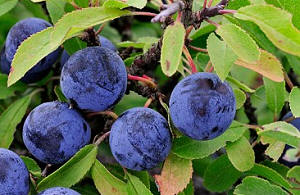
Looking for Sloe Berries:How to find local Blackthorn and make Sloe Gin in 2025? Scroll down this page and follow the links. And if you bring home some fruit or vegetables and want to preserve, freeze, make jam, salsa or pickles, see this page for simple, reliable, illustrated preserving, freezing or bottling directions. There are plenty of other related resources, click on the resources dropdown above.
If you have questions or feedback, please let me know! There are affiliate links on this page. Read our disclosure policy to learn more.
Sloe Berries:How to find local Blackthorn and make Sloe Gin
Sloe Berries and Making Your Own Sloe Gin
Most people know sloe berries only for their flavoring in "Sloe
Gin". But the berries are also a type of wild plum, like damson
plums, although they are extremely sour, too tart to be eaten fresh.
.
They are also known by another name; blackthorn berries, since
they are the fruit of the blackthorn tree (Prunus spinosa), which is
a thorny shrub.
Where to find sloe berries
The blackthorn shrub is commonly used throughout Britain as a hedgerow plant. You will sometimes find them growing in towns and cities in parks. The berries look like juniper berries, but the leaves have a different shape. . Sloe / Blackthorn leaves are oval shaped and lighter green than those of junipers. And Blackthorns can grow very big (up to 5 meters), while junipers are small. bush, The leaves and berries look a lot like dark blueberries, except with thorns on the branches and much, much bigger bushes
The berries also have a light pale coating, which can be wiped off with your thumb.
When to pick the berries
The berries ripen after the first frost of winter (usually late October to early November in most of the UK). After picking them, sloe berries are traditionally pricked with a thorn taken from the blackthorn bush on which they grow.
I'm told that these days most people simply pick the berries in August to October when they start to ripen (becoming a bit soft) and then freeze them, which accomplishes the same goals as pricking them..
Where to buy Sloe berries
If you cannot find sloe growing locally, you can buy it online.
In some years, Waitrose stores sell sloe berries.
Farms growing Sloe berries
Beaulieu Estate in the New Forest used to grow them, they still may, and last heard, sold them for £4.99 for a 1lb punnet.
Making Sloe Gin
- Clean the berries and wash them in cold water.
- Either prick then berries or freeze them to help extract the flavor.
- Add 1/2 cup of berries and about 1/2 cup of sugar to 1 liter of gin.
- Let it age for 2 to 12 months, gently swirling the bottle from time to time. How long you let it age is personal preference, only time, experience and tasting will tell!